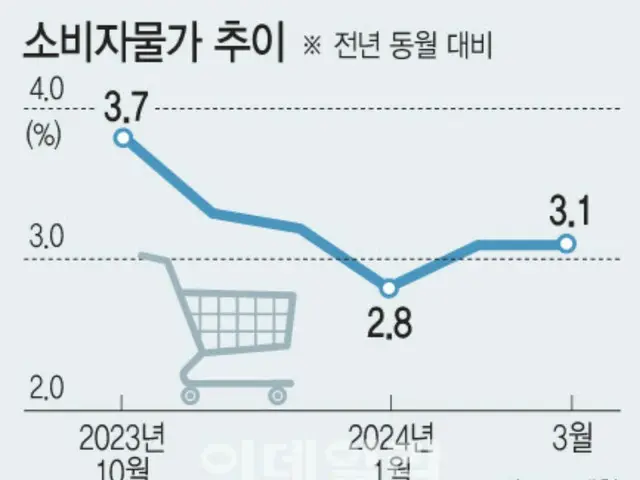Prices of fruits such as rice have also remained high, raising a warning light for the South Korean government's price control policy, which has set a goal of "maintaining an inflation rate in the high 2.5 percent range in the second half of the year."
The possibility of a clash between Iran and Israel emerged last weekend, and the prevailing view is that international crude oil prices will rise.
West Texas Intermediate (WTI) prices closed at $85.41 per barrel, down $0.25 from the previous trading day, but have already risen nearly 20% this year.
Brent crude oil has already exceeded $90 per barrel in about five months. Concerns over the expansion of the war have led the market to exceed $100, rising to $120-130.
There are also forecasts that the dollar will be 1,394 won per 10.5 won on the 16th, due to the tendency to move assets to safe assets.
In response, the Ministry of Strategy and Finance and the Bank of Korea jointly announced in the afternoon that the foreign exchange authorities had decided to review the exchange rate.
The government is closely watching the supply and demand of foreign currency with a sense of particular caution, and has begun verbal intervention. As South Korea is highly dependent on imported energy, high oil prices and the exchange rate have a strong influence on import prices.
This has an immediate impact on prices, leading to price hikes. In fact, with inflation rates at the 3% level recorded for two consecutive months, fruits and petroleum products were the biggest contributors to the inflation rate last month.
Prices rose 1.2% from a year ago, but this was the first increase in petroleum prices in 14 months since January of last year (4.8%). The contribution of petroleum to the overall inflation rate was also positive at 0.05%.
Fruit prices, which have had a major impact on inflation, have also stabilized somewhat thanks to support from the Korean government, but they are still higher than last year.
According to KAMIS, the price of 10 Fuji apples as of the previous day was 27,120 won (about 3,010 yen), down 7.75% from the previous month, but still 10% higher than last year.
The possibility of abnormal weather occurring again this year cannot be ruled out, and considering structural factors such as a decrease in cultivated area, it is unlikely that we can be optimistic about the crop yield, which will determine supply.
The South Korean government expects the inflation rate to peak at 3.1% recorded last month and to remain at the 2% range from the second half of the year. However, there is a two to three week time lag before the rise in international crude oil prices takes effect.
Considering that the price of petroleum products will be reflected in the price of oil in Korea, the price situation this month is also expected to remain high. Furthermore, if the situation in the Middle East worsens further, the future trend of prices and
In response to this, the South Korean government decided at an emergency meeting of economic ministers on the 15th to extend the reduction in oil taxes, in order to minimize the burden on the people's lives.
However, just like fruit, oil prices are also a supply-side issue, so there are limits to how much the government can intervene.
"If the situation in the Middle East worsens, oil prices may rise further, and the speed at which the situation in the Middle East is resolved will have a stronger impact on prices than the government's response," he said, adding that the government is considering lowering oil taxes.
However, there are still limits to what can be achieved.'
2024/04/17 07:03 KST
Copyrights(C) Edaily wowkorea.jp 107

